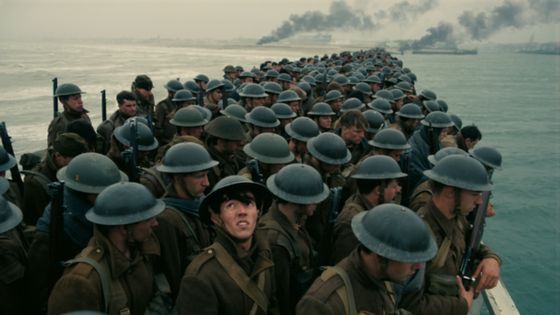
Christopher Nolan`s film about British, French and Belgian troops fleeing the beaches and harbour at Dunkirk, in Operation Dynamo, in 1940, has been this summer`s box-office hit - in the UK, in America and in France. But what do the people who live in the northern French seaside town itself think about it?
In a steel shipping container in a park in the Dunkirk suburb of Malo-les-Bains, there`s a temporary exhibition with text, photographs and a slideshow telling the story of Operation Dynamo, and of the making of the film Dunkirk.
In May 1940, with the north-east corner of France cut-off by Hitler`s army, 400,000 soldiers waited on the beaches for ships to take them to England - 200,000 British troops, 130,000 French and about 10,000 Belgians made it to safety, 60,000 did not.
Operation Dynamo was a coordinated effort by naval ships, pleasure steamers from British seaside resorts - and small motor yachts, most of which had been commandeered by the Royal Navy for the evacuation.
These "little ships", as they came to be known, had such shallow draught they were able to cross the sandbanks off Dunkirk and shuttle troops off the beach to larger ships anchored in deep water offshore.
Most of the buildings in Dunkirk were destroyed by wartime bombardment, so the street scenes in the film were shot in Malo-les-Bains.
In that shipping container in the park, I met three young boys who had dropped their bikes on to the grass outside to go in and watch the slideshow about the making of the film.
One of them had seen the film - "It`s very good" - and all three knew about the little ships.
Theo, Gael and Mael - aged between 11 and 13 - answered me almost in unison when I asked why the little ships were important.
"For Operation Dynamo - to get the soldiers off the beach and take them to England," they said.
In the first week of its release, 15,000 people saw the film on one of Dunkirk`s three main screens, and it was showing at two other cinemas in the town.
Across France, nearly a million watched it over the same period, making it the box-office number one.
There are posters and banners advertising the film all over Dunkirk, and banners recalling Operation Dynamo.
A telephone engineer and keen reader of World War Two history, Evrard Sebastien, offered a mixed review of the movie.
"It`s an average film," he said. "It won`t win any Oscars. It was a good idea to make it, but I was disappointed.
"The action sequences with the ships and the planes are very well done."
But, he added: "There are many missing details. There are hardly any French soldiers in it. And it was thanks to them to a significant extent that the British were able to evacuate at all."
For example, a seldom mentioned detail is that about 40,000 men in the French First Army delayed German progress towards Dunkirk from Lille, 80km (50 miles) to the south, where they eventually ran out of food and ammunition and were forced to surrender.
Gregory and Juliette Lefevre - she is a secondary school teacher, he sells industrial equipment - were more enthusiastic about the film: "Very good, very emotional. We really like it."
But they too were concerned that there was barely any reference to the French in the film.
Another Dunkirk woman who had seen the film, Isabelle Denele, said there was still a strong seam of gratitude in the town for Operation Dynamo.
She said: "The British had the courage to come and rescue their compatriots - that was magnificent. And, happily, the English were there to help us.
"And it`s an effective film for me because my parents were here.
"They lived in Dunkirk at the time of the evacuation and then lived under Nazi occupation.
"My parents had to learn German. They`re in their 90s now, and they can still speak German, and they don`t like it.
"My parents, my grandparents, were marked by that war. They lost a lot of friends. Dunkirk suffered a lot in that war."
Her husband, Bruno, expressed his gratitude with an unexpected comment about the revered French wartime leader in exile in London, who later became French president - Gen Charles de Gaulle.
Bruno believes the Dunkirk evacuation - inspired by the British wartime leader Winston Churchill - was an essential precursor to the D-Day landings four years later, which helped to save France from the Nazis.
"De Gaulle would have been nothing without Churchill," he said.
On the blustery July day that I visited the beach at Dunkirk, it was almost silent - and mostly deserted apart from some dog walkers and a few children making sandcastles.
Out to sea, sailing boats glided along - their sails sharply white against dark clouds in the distance - a peaceful scene, where it was hard to imagine the terror on this Dunkirk beach 77 years ago when 400,000 troops were under bombardment by German planes as they lined up to board ships to take them to safety.


0 comments:
Post a Comment